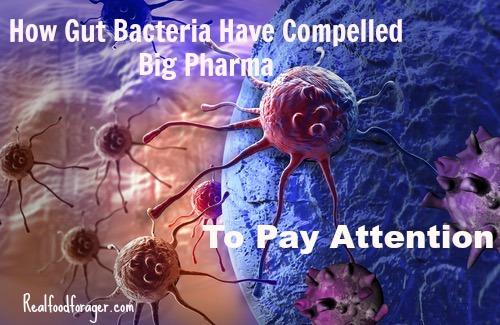
The gut microbiome is the focus of tons of research. Find out how gut bacteria have compelled Big Pharma to pay attention.
Several recent studies have highlighted the importance of gut bacteria to the immune system – so much so – that pharmaceutical companies are paying attention and pursuing a different approach to therapies for many serious diseases like autoimmune diseases and cancer.
Bifidobacterium Used in Cancer Research
For instance a recent study published in Science found bidfidobacterium to be associated with antitumor effects. They found that the mice hosting these bacteria had greater T cell infiltration of solid tumors (melanoma).
Importantly, they found that oral administration alone improved tumor control as effectively as use of drugs in the class of PD-1 inhibitors. Additionally, when the drug and the bacteria were taken together the tumor almost completely stopped growing.
The researchers concluded,
Our data suggest that manipulating the microbiota may modulate immunotherapy.
Just a few years ago you wouldn’t catch a scientist talking about gut bacteria, let alone attributing such an important finding to them.
What astonishes me, is that they are investigating common, easy to find (in probiotics or food) species of bacteria – types of bacteria that we have known to years to be beneficial.
Another recent study published in Science, highlighted the role of Bacteroidales in cancer therapy. According to the researchers,
Antibodies targeting CTLA-4 have been successfully used as cancer immunotherapy. We find that the antitumor effects of CTLA-4 blockade depend on distinct Bacteroides species… Fecal microbial transplantation from humans to mice confirmed that treatment of melanoma patients with antibodies against CTLA-4 favored the outgrowth of B. fragilis with anticancer properties. This study reveals a key role for Bacteroidales in the immunostimulatory effects of CTLA-4 blockade.
Clearly, gut bacteria are now studied as key modulators of host immunity, putting them in line for use alongside cancer immunotherapy.
This is actually a fantastic line of investigation and research. Even though Big Pharma is in it for the money – patients will also benefit from the specific and detailed research into which species can help us in various ways.
Giant Corporations Invest in Development of Bacteria Based Drugs
With so many pilot studies and research studies on the microbiome, even food companies are lending financial support to pharmaceutical companies. For instance, Nestle SA, the world’s largest food company has recently invested $65 million in Seres Health Inc., a US company busy developing drugs that enhance the beneficial effects of our gut bacteria (source).
Seres is at final-phase clinical testing of a drug called SER-109 which is designed to prevent the recurrence of Clostridium difficile – a gut infection so virilent, patients are preforming DIY fecal transplants as therapy when antibiotics fail (and they do fail) (source).
Hopefully, this drug will work for those with recurrent C. diff infections. C. diff is commonly passed to others with depressed immunity or spontaneously occur in people on antibiotics and in hospitals (as these drugs kill off the beneficial bacteria and allow the pathogenic C. diff to multiply).
Companies are acknowledging that the microbiome is of vital importance in health and disease. This is something nutritionists and alternative practitioners have been saying for years – cultivating beneficial gut bacteria is the first line of defense against disease in general and autoimmunity and cancer in particular.
How to Nourish and Nurture Gut Bacteria
Start to eat foods that are considered prebiotics. These are foods that have a lot of indigestible fiber – indigestible fiber or resistant starch is what the bacteria feed upon in the colon.
These foods are mainly vegetables – those with the most amounts of fiber are; Jerusalem artichokes, chicory, garlic, onions, leek, shallots, asparagus, beetroot, dandelion greens, fennel, peas, cabbage, nuts, and seeds. Grains also have fiber, but grains are not recommended unless they are organic, properly prepared by soaking, sprouting or fermentation and you know you can tolerate grains in general and gluten in particular.
The next step is to also eat cultured or fermented foods that already have tons of beneficial bacteria.
Start to introduce homemade yogurt, coconut milk yogurt, kefir, kombucha, beet kvass, sauerkraut, and pickles just to name a few. Incorporate these fermented foods into your diet in small portions at first as they pack a powerful amount of bacteria that can set off a Herxheimer reaction, or die-off, if introduced too quickly.
Those folks with a damaged microbiome may need more targeted treatments that restore the microbiome, such as Helminthic Therapy and Fecal Microbial Transplantation.
You Can Change Your Microbiome in Just Weeks or A Few Months!
With bacteria having the ability to reproduce every 20 minutes, you CAN change your microbiome in just a matter of weeks or months if you focus on eating bacteria-rich foods.
Cultured foods are a traditional way of preserving food and getting beneficial bacteria into the gut consistently.
As always when starting new foods, start very slowly with small amounts and/or consult your health care provider. See more of my disclaimer here.
If you are as fascinated by the new research on the microbiome and how that affects your health and the health of your family, you may be interested in a diet that supports your microbiome!
Start now.
Start by receiving my Getting Started series to start your real food journey! Get the series here!
Check out my newly released e-book, Heal Your Microbiome Optimize Your Health! It’s on sale today!
Original article and pictures take realfoodforager.com site
Комментариев нет:
Отправить комментарий